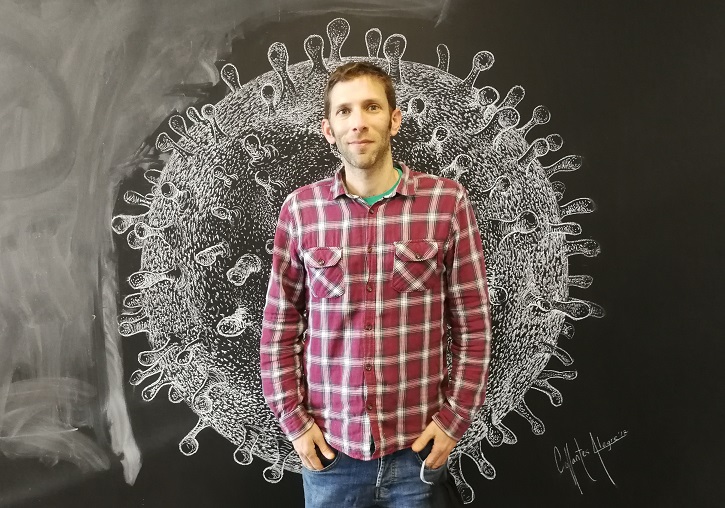I2SysBio leads three COVID projects to obtain a therapy against coronavirus
- Scientific Culture and Innovation Unit
- February 2nd, 2021

The researcher at the Institute of Integrative Biology of Systems I2SysBio (mixed centre University of Valencia-CSIC) Ron Geller leads three COVID projects in the field of therapies related to antivirals, antibodies, and immunomodulatory molecules. These three initiatives, which have a total budget of 600,000 euros (230,000 for the group at I2SysBio), are part of the eight research projects investigating the coronavirus led by the I2SysBio, which have received the support of the Valencian Government and the CSIC-CRUE-Santander, and in which other institutions also participate.
“SARS-CoV-2 has caused more than 2 million deaths and 100 million infections in less than a year. It has significantly altered the way we live and has affected everyone from young children to older people. In the laboratory, we try to better understand immunity against this virus by examining the neutralization of antibodies and identifying new means to block the virus to use it as therapy”, highlights Ron Geller, a Ramón y Cajal fellow and the head of the Viral Biology group at I2SysBio.
The project “COVID-19: anti-infectious and anti-inflammatory action of the molecules of the immunomodulatory parasite in a synthetic format for safe use” is an initiative that seeks to exploit the potential of the Fasciola hepatica parasite and its molecules to modulate the routes of entry and the routes of relevant inflammation in COVID-19. Mar Siles, from the Institute of Natural Resources and Agrobiology of Salamanca (IRNASA), the University of Córdoba and the National University of Ireland also participate in this project as well as the virologist Rafael Sanjuan from I2SysBio.
The BlockAce Initiative applies a multidisciplinary approach to identifying SARS-CoV-2 receptor entry and binding inhibitors through the combined use of knowledge from medical chemistry, computational chemical biology, structural biology, and virology. María Jesús Pérez, from the Institute of Medical Chemistry (IQM), the Margarita Salas Biological Research Centre (CIB) and the Valencia Institute of Biomedicine (IBV) are also part of this project.
“For these different projects, we have analysed more than 500 different compounds and more than 50 protein-based inhibitors from numerous collaborating institutions to find new means to block the ability of the virus to enter cells. From these experiments, we have identified several promising candidate drugs that effectively block the virus and are not toxic to cells”, says Geller.
Likewise, Geller explains that “in terms of understanding antibody responses, we have examined the association between the severity of the disease in hospitalised patients and the ability of antibodies in the blood to block the virus. In addition, we have evaluated the extent to which the results of rapid antigen tests, which are applied on a large scale to the population, correlate with the neutralisation of antibodies necessary to effectively block the disease. Finally, we have examined whether different mutations in the envelope protein of SARS-CoV-2 that have appeared during the pandemic reduce the ability of antibodies in the serum of recovered individuals to block the virus”.
Most of these studies have been implemented using the technology developedand optimized within the ANTICOR project. It comprises an economic, fast, safe, and high-performance platform for screening and evaluation of all types of compounds that block the entry of the SARS-CoV-2, such as antiviral drugs and antibodies.
Project links:
File in: Investigació a la UV , Institut de Biologia Integrativa de Sistemes (I2SYSBIO) , Producció científica , Internacionalització recerca , Facultat de Ciències Biològiques , Difusió i comunicació científica , Cultura Científica , Recerca, innovació i transferència
















